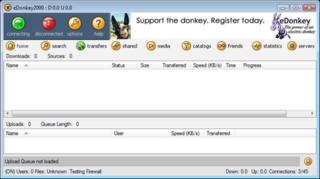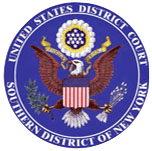
BearShare was a peer-to-peer file sharing application originally created by Free Peers, Inc. for Microsoft Windows and also a rebranded version of iMesh by MusicLab, LLC, tightly integrated with their music subscription service.
Kazaa Media Desktop is a discontinued peer-to-peer file sharing application using the FastTrack protocol licensed by Joltid Ltd. and operated as Kazaa by Sharman Networks. Kazaa was subsequently under license as a legal music subscription service by Atrinsic, Inc. According to one of its creators, Jaan Tallinn, Kazaa is pronounced ka-ZAH (/kəˈzaː/).
LimeWire is a discontinued free software peer-to-peer file sharing (P2P) client for Windows, OS X, Linux and Solaris. LimeWire uses the gnutella network as well as the BitTorrent protocol. A zero-cost version and a purchasable "enhanced" version were available; LimeWire Pro could be acquired through the regular LimeWire software without payment, as users distributed it through the software without authorization. BitTorrent support is provided by libtorrent.
Napster is a set of three music-focused online services. It was founded in 1999 as a pioneering peer-to-peer (P2P) file sharing Internet software that emphasized sharing digital audio files, typically audio songs, encoded in MP3 format. As the software became popular, the company ran into legal difficulties over copyright infringement. It ceased operations and was eventually acquired by Roxio. Napster became an online music store until it was merged with Rhapsody from Best Buy on December 1, 2011.

eDonkey2000 was a peer-to-peer file sharing application developed by US company MetaMachine, using the Multisource File Transfer Protocol. This client supports both the eDonkey2000 network and the Overnet network.
Grokster Ltd. was a privately owned software company based in Nevis, West Indies that created the Grokster peer-to-peer file-sharing client in 2001 that used the FastTrack protocol. Grokster Ltd. was rendered extinct in late 2005 by the United States Supreme Court's decision in MGM Studios, Inc. v. Grokster, Ltd. The court ruled against Grokster's peer-to-peer file sharing program for computers running the Microsoft Windows operating system, effectively forcing the company to cease operations.
BitTorrent is a communication protocol for peer-to-peer file sharing (P2P), which enables users to distribute data and electronic files over the Internet in a decentralized manner.
AllOfMP3, MP3Sparks and MemphisMembers are brands of online music store that were operated by Mediaservices, Inc., a company founded in 2000 in Moscow, Russia. The stores formerly sold music encoded in standard, non-protected audio formats at a significantly lower cost than other online music stores. In 2008, the original AllOfMp3 site was replaced by a blog.
A&M Records, Inc. v. Napster, Inc., 239 F.3d 1004 (2001) was a landmark intellectual property case in which the United States Court of Appeals for the Ninth Circuit affirmed the ruling of the United States District Court for the Northern District of California, holding that defendant, peer-to-peer (P2P) file-sharing service Napster, could be held liable for contributory infringement and vicarious infringement of the plaintiffs' copyrights. This was the first major case to address the application of copyright laws to peer-to-peer file sharing.
This is a timeline of events in the history of networked file sharing.
Arts and media industry trade groups, such as the International Federation of the Phonographic Industry (IFPI) and Motion Picture Association of America (MPAA), strongly oppose and attempt to prevent copyright infringement through file sharing. The organizations particularly target the distribution of files via the Internet using peer-to-peer software. Efforts by trade groups to curb such infringement have been unsuccessful with chronic, widespread and rampant infringement continuing largely unabated.
File sharing is the practice of distributing or providing access to digital media, such as computer programs, multimedia, program files, documents or electronic books/magazines. It involves various legal aspects as it is often used to exchange data that is copyrighted or licensed.
File sharing is the practice of distributing or providing access to digital media, such as computer programs, multimedia, documents or electronic books. Common methods of storage, transmission and dispersion include removable media, centralized servers on computer networks, Internet-based hyperlinked documents, and the use of distributed peer-to-peer networking.

The Recording Industry Association of America (RIAA) is a trade organization that represents the recording industry in the United States. Its members consist of record labels and distributors that the RIAA says "create, manufacture, and/or distribute approximately 85% of all legally sold recorded music in the United States". RIAA is headquartered in Washington, D.C.
In the first decade of the 21st century, the rise of digital media on the internet and computers as a central and primary means to record, distribute, store, and play music caused widespread economic changes in the music industry. The rise of digital media with high-speed internet access fundamentally changed the relationships between artists, record companies, promoters, retail music stores, the technology industry, and consumers. The rise of digital music consumption options contributed to several fundamental changes in consumption. One significant change in the music industry was the remarkable decline of conventional album sales on CD and vinyl. With the A la carte sales models increasing in popularity, consumers no longer download entire albums but rather choose single songs.
Grooveshark was a web-based music streaming service owned and operated by Escape Media Group in the United States. Users could upload digital audio files, which could then be streamed and organized in playlists. The Grooveshark website had a search engine, music streaming features, and a music recommendation system.
Music piracy is the copying and distributing of recordings of a piece of music for which the rights owners did not give consent. In the contemporary legal environment, it is a form of copyright infringement, which may be either a civil wrong or a crime depending on jurisdiction. The late 20th and early 21st centuries saw much controversy over the ethics of redistributing media content, how much production and distribution companies in the media were losing, and the very scope of what ought to be considered piracy – and cases involving the piracy of music were among the most frequently discussed in the debate.

Arista Records LLC v. Lime Group LLC, 715 F. Supp. 2d 481, is a United States district court case in which the Southern District of New York held that Lime Group LLC, the defendant, induced copyright infringement with its peer-to-peer file sharing software, LimeWire. The court issued a permanent injunction to shut it down. The lawsuit is a part of a larger campaign against piracy by the Recording Industry Association of America (RIAA).
Torrent poisoning is intentionally sharing corrupt data or data with misleading file names using the BitTorrent protocol. This practice of uploading fake torrents is sometimes carried out by anti-infringement organisations as an attempt to prevent the peer-to-peer (P2P) sharing of copyrighted content, and to gather the IP addresses of downloaders.
Metallica, et al. v. Napster, Inc. was a 2000 U.S. District Court for the Northern District of California case that focused on copyright infringement, racketeering, and unlawful use of digital audio interface devices. Metallica vs. Napster, Inc. was the first case that involved an artist suing a peer-to-peer file sharing ("P2P") software company.




